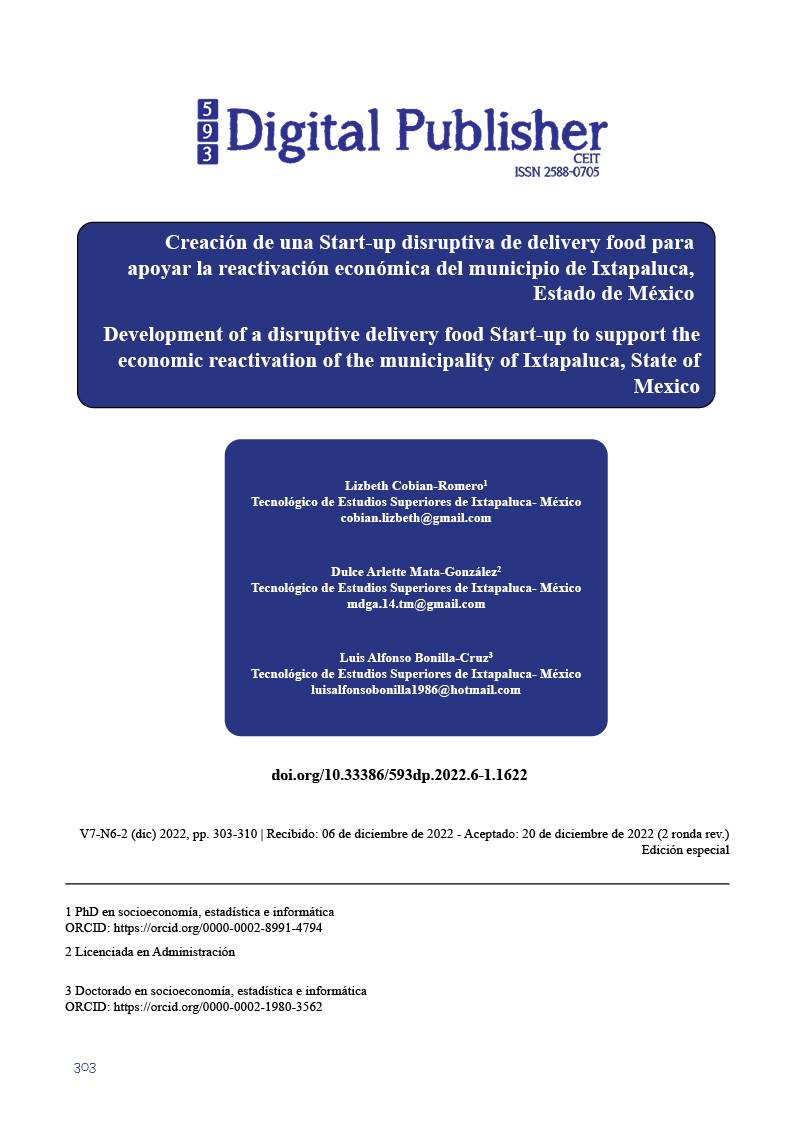Development of a disruptive delivery food Start-up to support the economic reactivation of the municipality of Ixtapaluca, State of MexicoAbstract
Main Article Content
Abstract
In the preamble to the financial crisis caused by COVID 19, the need arises to create enterprises that promote the development of the country. The objective of this project was to support one of the most affected sectors during the pandemic: the food services sector in a marginalized community in the municipality of Ixtapaluca, State of Mexico. For this, a food delivery startup called ixfood.mx was created based on the methodology of the Canvas business model. This enterprise has generated jobs and has allowed the adaptation to the new needs that arose in a neglected market for this geographical area. Also through the realization of strategic alliances, the use of platforms, QR codes, social networks, etc. Support has been given to micro and small businesses dedicated to food preparation by granting them publicity, a home delivery service and more forms of payment; tools that are not always available as they are small businesses with limited capacities. This venture was the first in the area mentioned and allowed businesses to continue offering their food in the area, while generating profits for investors and jobs for the area, so the Canvas model developed, can be replicated in other areas and thus contribute to regional socioeconomic development.
Keywords: Canvas model, food, entrepreneurship, startup
Downloads
Article Details

This work is licensed under a Creative Commons Attribution-NonCommercial-ShareAlike 4.0 International License.
1. Derechos de autor
Las obras que se publican en 593 Digital Publisher CEIT están sujetas a los siguientes términos:
1.1. 593 Digital Publisher CEIT, conserva los derechos patrimoniales (copyright) de las obras publicadas, favorece y permite la reutilización de las mismas bajo la licencia Licencia Creative Commons 4.0 de Reconocimiento-NoComercial-CompartirIgual 4.0, por lo cual se pueden copiar, usar, difundir, transmitir y exponer públicamente, siempre que:
1.1.a. Se cite la autoría y fuente original de su publicación (revista, editorial, URL).
1.1.b. No se usen para fines comerciales u onerosos.
1.1.c. Se mencione la existencia y especificaciones de esta licencia de uso.
References
Arias, K. (2022). Impacto de la crisis sanitaria covid19, en las finanzas del sector alimentos y bebidas en la ciudad de Ibarra. Tesis. Universidad Técnica del Norte, Ecuador.
Editor (2018, 12 marzo). ¿Qué es un checklist y cómo se debe utilizar? Software ISO. Recuperado 8 de enero de 2022, de https://www.isotools.org/2018/03/08/que-es-un-checklist-y-como-se-debe-utilizar/
El boom del food delivery, un sector en auge. (2021, 8 junio). SDS Hispánica. Recuperado 26 de noviembre de 2021, de https://sdshispanica.com/2020/09/boom-food-delivery/
Fernández, F. (2021). 90 mil restaurantes han cerrado en méxico por la pandemia de COVID-19: Canirac. El financiero. Published. Recuperado 03 de noviembre de 2021, de https://www.elfinanciero.com.mx/economia/15-o-90-mil-restaurantes-han-cerrado-en-mexico-por-
ernández Gorrín, Alejandro, (2019). Análisis FODA o DAFO. Recuperado de: https://economiatic.com/analisis-dafo-foda/
Korže, S. Z. (2018). Airbnb and Uber: legal platform but illegal networked business. Peer-reviewed academic journal Innovative Issues and Approaches in Social Sciences.
Osterwalder, A. (2004). The business model ontology a proposition in a design science approach (Doctoral dissertation, Université de Lausanne, Faculté des hautes études commerciales).
Osterwalder, A., & Pigneur, Y. (2010). Generación de modelos de negocio (1 ed.). (L. Vàzaquez, Trad.) Barcelona, España: Grupo Planeta. Recuperado el 2020
Stephen J. Harper. (2019). El emprendedor. Editorial MACLEANS.
Xavier, J. (2012, septiembre 21). 75 % of Startups fail, but it’s no biggie. Recuperado de https://www. bizjournals.com/sanjose/blog/2012/09/mostStartups-fail-says-harvard.html
Xiao, P., & Liu, X. (2019). The Enactment of the e-Commerce Law in China and its Impact on Food e-Commerce. European Food and Feed Law Review, 14(3), 257-260.
Zuluaga, M. E. G., & Morales, J. C. B. (2016). Startup y spinoff: una comparación desde las etapas para la creación de proyectos empresariales. Revista ciencias estratégicas, 24(36), 365-378.




